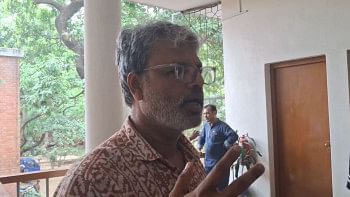‘Bangladesh can learn about blockchain regulations from others’

Experts have backed Bangladesh's aspirations to use blockchain technology to achieve Sustainable Development Goals which aim to foster innovation. In a policy review published in the quarterly magazine Whiteboard, Primavera De Filippi and MorshedMannan discussed the use cases of blockchains and how Bangladesh can learn from other countries who have already adopted the technology.
Filippi and Mannan are legal researchers specialising in emergent technologies, the legalities of blockchain, and digital governance. Filippi is a permanent researcher at the National Centre of Scientific Research (CNRS) in Paris while Mannan is a research associate on blockchain governance at the Robert Schuman Centre for Advanced Studies at the European University Institute in Florence.
The authors dissected the National Blockchain Strategy (NBS), which was first published in March 2020, and commented on the better identification of permissioned and permissionless blockchains in strategies going forward. They argued that a permissionless blockchain runs an increased risk of tampering. There is an acute need to trust third parties, which is why the value-addition using a permissioned blockchain may be limited. On the other hand, permissionless blockchains rely on an "authority of trusted peers" -- governments or banks -- to determine the security of the blockchain and the integrity of its data. This means that trust is ensured in institutions in a permissionless blockchain. The authors, however, indicated the benefits of permissioned blockchains, citing the case of Estonia where Keyless Signature Infrastructure (KSI) was used to ensure data integrity of the country's digital court system, healthcare, and land registries. The data is stored in hash values and are placed in the blockchain, instead of the sensitive personal data of citizens, allowing all parties involved to track any changes made to the hash values.
Filippi and Mannan argued hash values can ensure that it is nearly impossible to tamper with land ownership documents since any attempt will immediately alter the hash value in the permissioned blockchain. This can ensure a strong performance in the land record registries and may improve the country's ranking in the World Bank's Doing Business rankings, further putting to rest concerns regarding paper-based registers and the risk of accidents.
Along similar lines, self-sovereign identity systems, including electronic know-your-customer (eKYC), can be adopted as suggested in the NBS 2020. Blockchain-driven eKYC can allow identifiers like biometric data, gender, or physical attributes, to be stored on a person's device or distributed network with access to only authorised entities, reliably verifying a person's identity without physical documents.
Further ambition can be shown in extending blockchain technology to healthcare, where patients will store their relevant information on blockchains, and doctors will avail access when needed. With this use case, Filippi and Mannan also highlighted the challenges of data privacy, the scopes of which were not discussed in the NBS 2020. In addition, the policy review sheds light on the potential for blockchains in decentralised autonomous organisations (DAOs) which can introduce economic democracy in tech-based workplaces. Blockchains can empower an individual's reputation based on the quality of their work than the amount of equity they hold or their managerial position. Therefore, their reputation will determine the weight of their say in the governance of the organisation. A well-managed DAO integration can ensure democratisation of the entire organisation, allowing workers to have a voice in workplace conduct and relevant business decisions.
While Bangladesh announced a "regulatory sandbox" to experiment with blockchains without harming the public or investors, the big-picture policies are still an impetus to the adoption of blockchains. For starters, allowing cryptocurrency "mining and holding" will require the government to revise laws on licensing cryptocurrency mining, and tax such blockchain assets. Removing sanctions, overall, will require great care in policy to address the technological intricacies and proactive effort to create a healthy ecosystem for adopting blockchains.

 For all latest news, follow The Daily Star's Google News channel.
For all latest news, follow The Daily Star's Google News channel. 



Comments